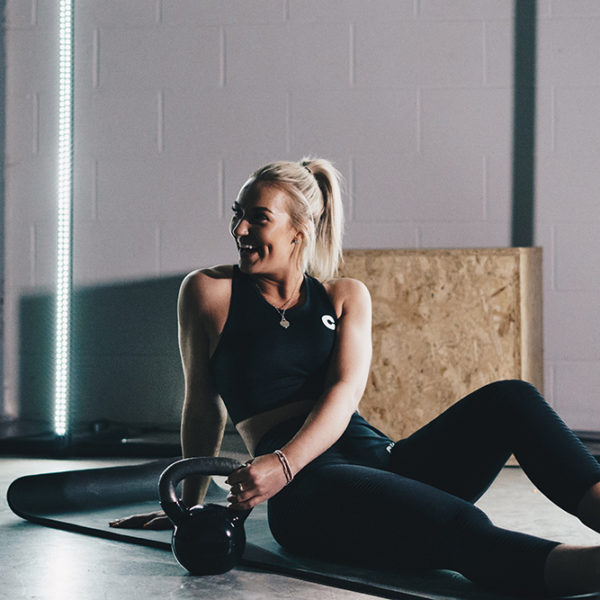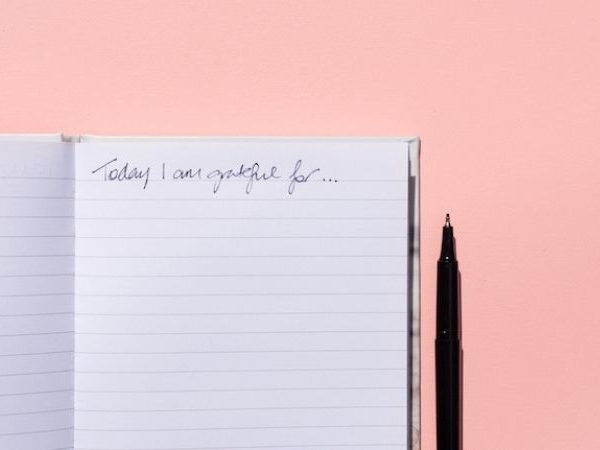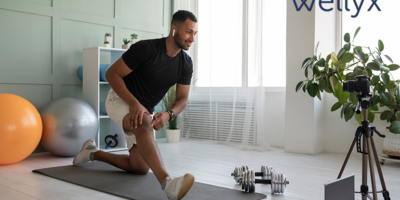7 easy ways to reduce stress by tonight
Feeling stressed? For Stress Awareness Day, Healthista spoke to the experts to find out how we can reduce stress quick – here are seven easy ways
Wouldn’t life be so much easier if you could just erase your stress?
You could get so much more done and enjoy the good parts of your life if you weren’t kept up at night with worries about the following day.
What would really help is a month away in the Caribbean, right? But sadly for most of us, the luxury of time is something we don’t have – not to mention Covid-19 halting pretty much all of our plans this year.
Speaking of Covid-19, that alone has caused people to have elevated stress and anxiety levels – let alone job stress, family stress and just general life stress.
Speaking of Covid-19, that alone has caused people to have elevated stress and anxiety levels
In fact, a recent Government survey showed that a staggering 69 per cent of UK adults reported feeling worried about the effect Covid-19 is having on their life and doctors in the UK have seen an increase in people coming to them with anxiety issues.
That’s why Healthista have put together a list of seven ways you can de-stress by tonight and help you to calm down when you’re feeling overwhelmed…
#1 Just breathe
Meditation may be hailed as the ultimate mind relaxer, but it isn’t for everyone – especially if you struggle to silence your busy thoughts.
Instead, all you need is five minutes of gentle breathing, both in the morning and in the evening.
Lie down on your bed, floor or sofa with your head supported and body covered by a blanket for warmth if needed. Observe your breathing without forcing it to change until it naturally becomes longer and slower, helping you relax.
breathing exercises can help to alleviate stress
‘Over time, many of us develop a pattern of breathing through our chest which maintains stress,’ says Psychologist, Dr Meg Arroll.
‘But breathing exercises can help to alleviate stress. It’s one of the simplest yet most effective techniques I use personally and suggest to my clients.
‘The breathing technique I like to use is this: place one hand on your upper chest and one on your belly – if the hand on your chest is moving, you’re likely to be in a state of stress. To combat this, breathe deeply through your diaphragm, in for a count of four and out for a count of five.
‘Your belly should lift on the inhale and dip on the exhale. This activates the parasympathetic nervous system to halt the fight-or-flight stress response.
‘Practice this on a daily basis so that the technique is easy to access in times of heightened stress as well as maintaining a calm breathing pattern,’ suggests Dr Meg.
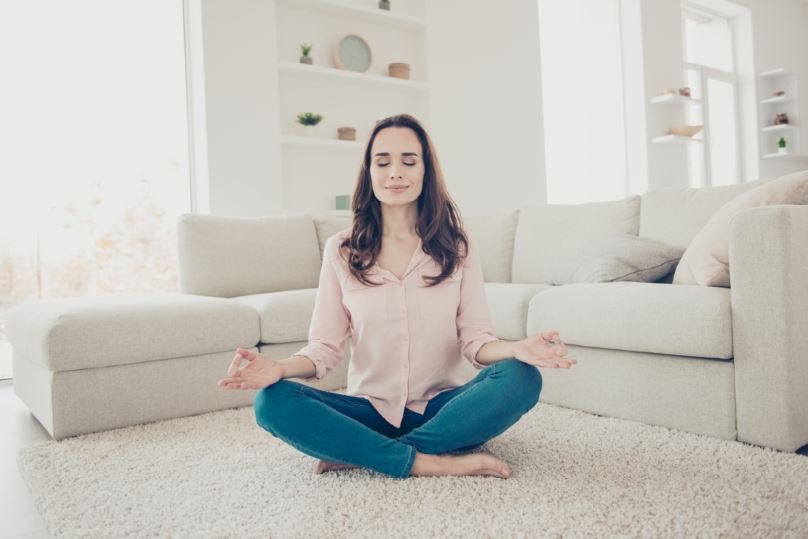
#2 Walk it off
Walking helps to regulate stress hormones without generating more – unlike running and other hard exercise, which can.
Walking also helps relax tense shoulder muscles and with the habitual breath holding that stress causes.
Try and walk outside for 30 to 45 minutes each day. If you can, track your steps (via a fitness watch or health app on your phone) and try and clock up 8,000 to 15,000 steps throughout the day.
‘In fact, research shows that just ten minutes of walking lifts mood and can help to protect you against symptoms of depression,’ reveals Dr Meg.
research shows that just ten minutes of walking lifts mood
‘Mindful walking is a technique whereby you bring yourself back to the present by focusing on either your steps or surroundings. By aligning our attention back to the moment, we’re able to stop ruminative thought patterns and restore a sense of equilibrium’.
Dr Sarah Brewer, Medical Director of Healthspan and author of Cut Your Stress – An Easy To Follow Stress Free Living Guide also says that walking is one of the best forms of exercise for reducing stress – so much so that it also helps to lower raised blood pressure.
‘Researchers assessed the benefits of different intensities of exercise on blood pressure, on over 33,000 runners and almost 16,000 walkers, who were followed for six years.
‘They found that equivalent ‘doses’ of running (a vigorous exercise) and walking (a moderate exercise) produced equivalent reductions in the risks of developing hypertension (and also lowered risks of developing high cholesterol, diabetes or heart disease) based on the amount of energy expended.
‘So, rather than running for, say 20 minutes, three times a week, you could expend half the energy and walk briskly for 40 minutes, three times a week, to achieve similar benefits,’ suggests Dr Brewer.

#3 Rest up
And no that doesn’t just mean sleep. But the odd opt-out Sunday rest day can help.
We can’t avoid those screaming children or demanding bosses but opting for rest between stressful times helps prevent the development of the hard-to-shift stress related conditions such as bad skin, lower sex drive, lack of concentration and focus.
‘Pepper your day with rest breaks,’ suggests Dr Meg. ‘This doesn’t necessarily mean taking a nap, but instead try ‘active’ forms of rest that allow you to switch off, such as listening to music, doing something creative or whatever allows you to ‘get outside of your head’ as it were.
try ‘active’ forms of rest that allow you to switch off, such as listening to music
‘Repetitive and intrusive thoughts are one of the most pervasive factors when it comes to chronic stress so by making time every day for some sort of mind rest, you may not feel the need for an entire day under the pillows.
‘However, we do have a weekend for a reason so I would strongly recommend taking time off work for a solid period if you are suffering from stress, wherever this lands in your current ‘new normal’ week’.
#4 Boost your feel-good endorphins
Sugar creates a surge of ‘beta-endorphins’ or natural opoids in the brain – as well as weight gain – and repeated studies have shown that continuous stress increases cravings for it.
But instead of reaching for sugar in order to increase your feel-good endorphins, make your own by laughing, listening to music or having sex.

#5 Make smarter drink choices
Speaking of sugar, we all know that alcohol contains its fair share of it. If you are going to reach for the booze, Champagne or dry white wines contain less sugar than sweeter wines. Beers too are a better choice for anyone wanting a celebratory drink without copious amounts of sugar.
Although if you do drink, try not to overdo it. ‘Drinking more than the recommended amount of alcohol has harmful effects on health and can make stress worse, says Dr Brewer.
‘This is because when metabolising alcohol, we use up B group vitamins which are also needed for a healthy stress response.
‘A lack of B group vitamins can in itself lead to stress-related symptoms such as tiredness, anxiety and irritability, making symptoms worse. Stress also depletes the body of calcium and magnesium so a multivitamin and mineral supplement is a good idea as a nutritional safety net’.
Substance use including alcohol is a maladaptive coping strategy
Oh and where supplements are concerned, here is a little tip – the night before and the morning after drinking alcohol try taking 1000mg of vitamin C as this may help your liver detoxify alcohol quicker.
‘Substance use including alcohol is a maladaptive coping strategy – which simply means that yes, it does help to manage stress but not in a good way,’ says Dr Meg.
‘Alcohol negatively affects sleep quality, so while it may make you drowsy at first, later in the night it will disrupt sleep cycles which is one reason why people feel tired after a heavy night even when they’ve been in bed all day!
‘What’s useful here is to notice when you feel the need to grab a boozy drink (after a long day or work or when you’ve had to deal with certain people) and replace this coping mechanism with something a little healthier like exercise, talking to a trusted mate or listening to a meditation app.
‘Do however have a tipple when you fancy it as we don’t want to demonise any behaviour – but know the awareness of its role’.
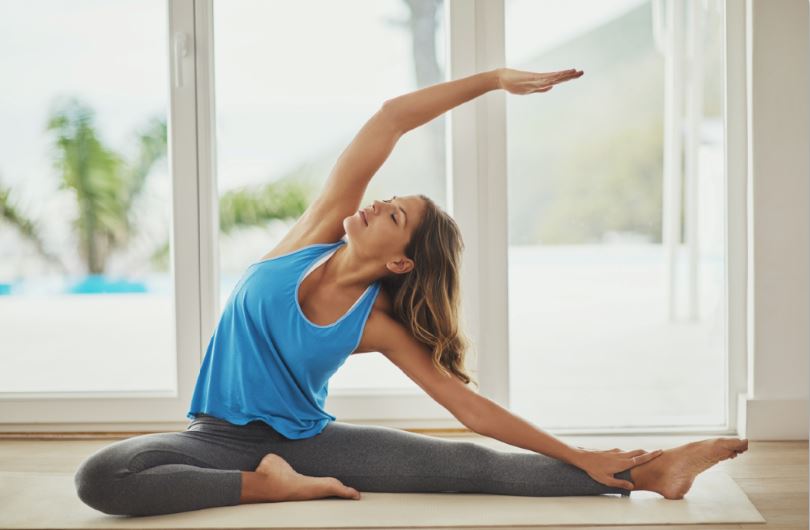
#6 Try yoga
This doesn’t mean complicated headstands and pretzel-shaped poses, but simple postures that encourage deep, slow breathing while also helping you to focus.
Yoga counters the effects of stress, such as muscles tightened by the flight-flight-or-freeze stress response are reduced as is postural stiffness from sitting on chairs.
‘Yoga has been shown in studies to help reduce stress,’ says Dr Meg. ‘One reason for this is that yoga involves diaphragmatic breathing practices which help to reduce the physiological stress response. Yoga also helps us to focus on the present with its meditative qualities’.
yoga has been shown not only to successfully reduce stress
In review studies yoga has been shown not only to successfully reduce stress but also increase positive affect (i.e. good mood), mindful awareness and self-compassion.
‘What’s more, it has also been demonstrated that practicing yoga moderates the production of the stress hormone cortisol, which is an objective measure of stress. That’s why yoga is an excellent method of stress management and I believe the improvements in strength, balance and flexibility can additionally help to boost confidence,’ adds Dr Meg.
#7 Make yourself a stress-busting tool kit
‘Remember, stress in itself isn’t a bad thing as our stress response is a survival mechanism – it’s when we experience long-term stress that it has an impact on our health,’ says Dr Meg.
If you’re experiencing chronic stress, Dr Meg suggests that you make yourself a Stress-Busting Tool Kit.
Here are some items Dr Meg says you might want to include:
Meditation apps
Headspace is a popular option and has some free meditations called ‘Weathering the Storm’ which you can listen to either on a daily basis or when feeling particularly stressed.
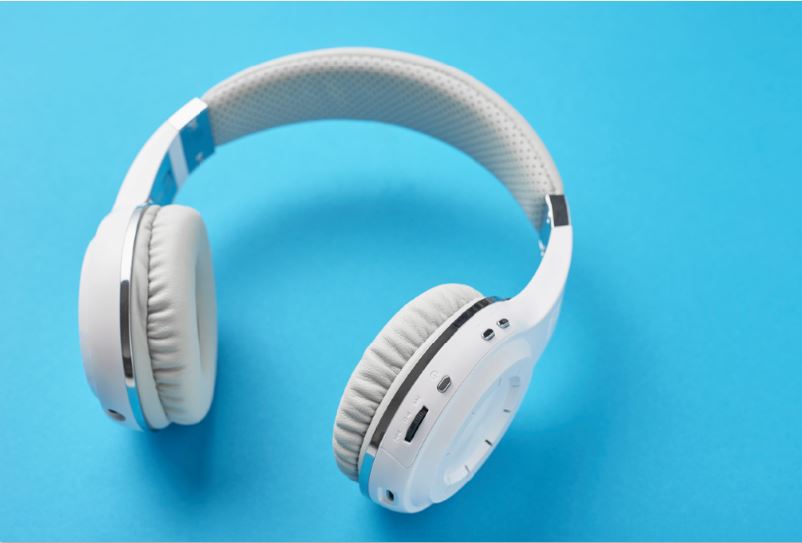
Audio books and/or music
I personally find the sound of someone’s voice very relaxing and often it help me rest or sleep during or after a manic day.
I think of it almost as adult bedtime stories. Experiment and find whatever works for you, whether it’s a particular voice or type of music.
Supplements
Magnesium is depleted during times of chronic stress, so think about adding something like Healthspan’s Magnesium 375mg to your daily self-care plan.
Vitamin B-complex has also been shown to help maintain positive mood and deal with psychological stress when under intense work pressure – try Healthspan’s High Strength Vitamin B Complex.
Security blankets
This is very Hygge and a recent Healthspan survey found that around a third of us still turn to this Scandinavian trend when we need comfort.
Hot water bottles, fluffy socks, soft lighting, you can choose whatever you like to create a personal comfort blanket – it doesn’t need to be an actual blanket but I certainly use my heated throw in winter when I need to switch off.





